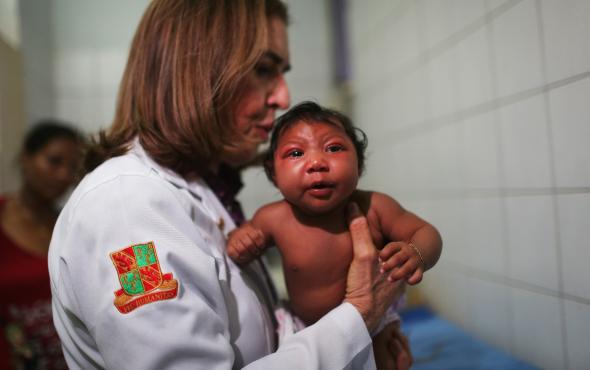Republicans in Congress say that microcephaly isn’t all that bad, and women in South and Central America who contract the mosquito-transmitted Zika virus shouldn’t terminate pregnancies if they are concerned that their fetus may have the associated birth defect. At a hearing about Zika on Wednesday, Rep. Jeff Duncan, R-S.C., decried calls by global health experts, including the highest-ranking human rights leader in the United Nations, for increased access to abortion and contraception in the countries beset by the fast-spreading virus. “This push for more abortion access is heartbreaking, especially since there are different degrees of microcephaly,” Duncan said, and some children born with the birth defect, which has spiked in Brazil in the months since the onset of the Zika epidemic, “go on to lead very normal lives.”
Several Latin American and Caribbean government officials have recommended that women in their Zika-afflicted nations avoid pregnancy for the next year or two to prevent microcephaly, a rare birth defect that causes stunted brain and head development, plus associated problems with hearing, seizures, motor functions, and cognition. The Helms amendment has prevented the United States from providing foreign aid for abortion-related services since 1973, but aid for contraception, which can be hard to access and afford in the countries currently grappling with the epidemic, should be on the table.
In Wednesday’s hearing, Duncan admitted that asking women not to get pregnant for two years is an impossible order. (It’s especially absurd without equivalent conversations with men about preventing pregnancy and halting rape.) But he stopped short of recognizing that contraception access in Latin America would help prevent a regionwide crisis. “Each child is made in the image of God and has inherent worth,” he said, recommending that women simply accept their children if they’re born with microcephaly.
Because of the harsh restrictions on abortion throughout Latin America, microcephaly is a greater threat to the region’s public health than Zika, which is largely harmless and only causes symptoms in 1 out of every 5 infected patients. Abortion is severely regulated in Brazil, which criminalizes the procedure in nearly all cases, and it’s banned in Haiti, Honduras, and Suriname, which have all begun to see the spread of Zika. Zika has also taken hold in El Salvador, where women and doctors have been sentenced to up to 40 years in prison for abortion-related charges; even women who have miscarriages or stillbirths are often reported to the police for investigation. Congressional Democrats and advocates like Zeid Ra’ad Al Hussein, the U.N.’s human rights head, have urged these countries to make abortion and contraception available to women to avoid a microcephaly crisis. “Laws and policies that restrict [women’s] access to these services must be urgently reviewed in line with human rights obligations,” Al Hussein said earlier this month.
Rep. Chris Smith, R-N.J., disagrees. Instead, he recommends measures to “ensure that any child born with disabilities from this or any other infection is welcomed, loved, and gets the care that he or she needs.” He cited a BBC article, “Microcephaly: ‘It’s Not the End of the World,’ ” a personal narrative from the mother of a child born with the birth defect, as an argument against aborting an afflicted fetus. “I wouldn’t choose to have my child to be born with microcephaly, and people should take precautions,” the mother writes.
Even without the threat of Zika, women will get abortions whether it’s legal or not—the safety of the procedure is what’s at stake. As more Latin American women see an uptick in microcephaly, more will seek abortion services to prevent them. Of course children with microcephaly should get the best medical care. Willfully denying women safe prevention measures won’t do anything to help those children.
